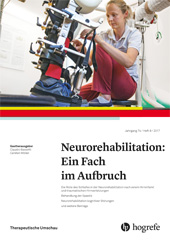Kognitive und neuropsychiatrische Frührehabilitation
Neuropsychologische und milieutherapeutische Behandlungsansätze
Abstract
Zusammenfassung. Hirnverletzte Patienten mit besonders schwer ausgeprägten Störungen in kognitiven Funktionen, wie z. B. Orientierungs- und Gedächtnisleistungen, Aufmerksamkeits- und Exekutivleistungen, Wahrnehmungsverarbeitung und Kommunikation benötigen im Anschluss an die Akutversorgung möglichst zeitnah intensive stationäre Neurorehabilitation. Nicht selten scheitert die Integration dieser Patientengruppe in klassische Rehabilitationssettings aufgrund deliranter Symptomatik, starker Antriebsminderung oder Agitiertheit, fehlendem Störungsbewusstsein sowie fremd- und selbstgefährdendem Verhalten im Rahmen reduzierter Verhaltenssteuerung und Impulskontrolle. Die stationäre Neurorehabilitation dieser Patientenklientel erfordert daher ein flexibel am individuellen Bedarf orientiertes milieutherapeutisches Stationssetting, spezialisierte therapeutische, medizinische und pflegerische Angebote sowie ein eng kooperierendes interdisziplinäres Behandlungsteam. Der intensive Einbezug des sozialen und familiären Kontextes sowie ein langfristig angelegtes Rehabilitationskonzept sind von besonders hoher Bedeutung. Zielsetzung ist die Reduktion von nicht indizierten Verlegungen neurologischer Patienten in psychiatrische Behandlungsformen und Institutionen der Langzeitpflege sowie die Einleitung der Reintegration in den prämorbiden Lebenskontext.
Abstract. Victims of brain injuries are in need of intensive in-patient neurorehabilitation as fast as possible after the incident. This is especially important for injuries with significant impact on cognitive functions, such as loss of orientation and memory performance, attentional and executive functions, perception processing, and communication. The integration of this group of patients into classic settings of rehabilitation often fails due to the specific symptoms of their injury: delirium, significant apathy or agitation, missing awareness of deficits and being a danger to self and others because of reduced behaviour and impulse control. In-patient neurorehabilitation in such cases requires a therapeutic milieu concept that is adapted to individual needs and provides specialized psychological, medical, therapeutic, and nursing offers by an interdisciplinary team. The integration of family and social contexts as well as a long-term rehabilitation concept are of vital importance. Treatment target is to reduce transfers of neurological patients to institutions of exclusively psychiatric or longtime care and instead initiate the reintegration into their premorbid contexts of life.



